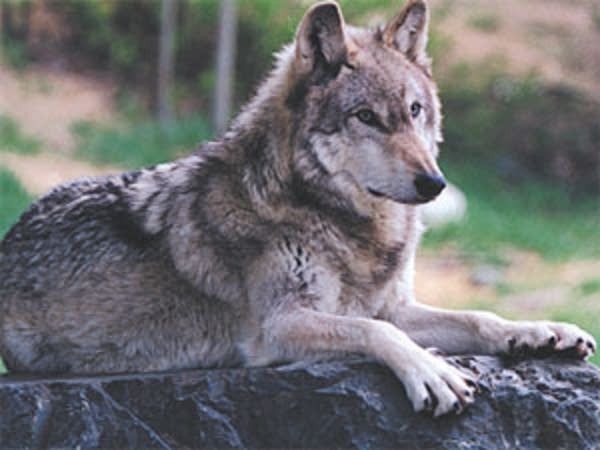Funding expires to capture, remove protected timberwolves
Go Deeper.
Create an account or log in to save stories.
Like this?
Thanks for liking this story! We have added it to a list of your favorite stories.

For over 35 years, federal wolf trappers in Minnesota have captured timberwolves that have preyed on livestock, killed pets or threatened people. Federal funding for the program expired today, ending their work.
Supporters of the program are worried that ranchers and others who feel threatened by wolves may kill wolves themselves, even though the predators remain protected.
Richard Godbout, who tends 45 head of cattle on his farm in Cromwell, southwest of Duluth, is particularly worried. Earlier this year wolves killed 10 of his calves. Federal trappers caught twelve wolves on his property, but when a trapper came to his place last week, he told Godbout it would be his last visit.
"Where does that leave the farmer?" Godbout asked. "Is he just supposed to sit and watch the wolves eat up their calves?"
Turn Up Your Support
MPR News helps you turn down the noise and build shared understanding. Turn up your support for this public resource and keep trusted journalism accessible to all.
Godbout is bitter. At 77, he's trying to scratch out a living, farming with his son. But he expects the predators to eventually eat him out of business.
"I can't afford $4 gallon fuel, to make hay to feed my cows, so the cows can have calves, to feed the timberwolves," he said. "That's what it boils down to."
The state does reimburse farmers who lose livestock to wolves. But the legislature only allocates $75,000 per year, which is rarely enough to pay all the claims.
Wolves are listed as threatened in Minnesota under the Endangered Species Act. It's illegal to kill wolves, unless they threaten personal safety.
The wolf trapping program was a way to remove wolves that threatened livestock and pets. But its loss of funding means that if a farmer like Godbout sees a wolf attacking his cattle, there's nothing he can do — at least legally.
That worries U.S. Fish and Wildlife Agent Patrick Lund, who supervises special agents in Minnesota and Wisconsin charged with investigating crimes against wildlife. Lund expects his staff's caseload to increase.
"My main concern is that if that funding is not there, that could actually lead to farmers and landowners and the general public taking matters into their own hands, when it comes to wolf depredation issues," Lund said.
Federal trappers have caught and killed nearly 200 wolves in each of the past two years in Minnesota. This year they were on pace to reach 250.
Over the years the wolf trapping program was funded by congressional earmarks. But earlier this year, several wildlife services programs within the USDA fell victim to an earmark ban in Washington — including the $276,000 for Minnesota's trapping program. So far the funding hasn't been included in the agency's appropriations.
Dan Stark, large carnivore program leader for the state Department of Natural Resources, fears the loss of the program will fuel a backlash against wolves.
"If people know their problems are going to be addressed, then having wolves out there is more acceptable," Stark said. "If the problem is not going to be addressed then they're going to have issues, and it has the potential to erode people's attitudes towards wolves."
But some environmental organizations reject that argument.
"We're not aware of any science that supports the theory that killing wolves actually increases public tolerance of wolves, or decreases illegal killing of wolves," said Collette Adkins Giese, a staff attorney with the Center for Biological Diversity in Minneapolis. "When you think of it broadly, wolves have been exterminated across most of the U.S., and that really has done little to increase tolerance for wolves."
Still, with federal protection, wolves have thrived in Minnesota. They now number over 3,000.
In May, the U.S. Fish and Wildlife Service issued a proposal to remove wolves from protection under the Endangered Species Act. A final rule is expected by the end of the year. Stark, of the Department of Natural Resources, said the Minnesota plan that would kick in at that point provides for trapping and grants residents more leeway as well.
"Anywhere in the state, if a wolf is stalking, attacking or killing their livestock or pets, a person can shoot it," he said.
It's far from certain that effort to remove endangered species protection for wolves will go through. But it is certain that in the short term farmers like Godbout lack any legal recourse to defend their livestock against wolves.
"That's what gets a man mad, you know," Godbout said. "You've got something going on, you've got no control over, and you can't do nothing about, so where you at. And no one really seems to care."
Dear reader,
Political debates with family or friends can get heated. But what if there was a way to handle them better?
You can learn how to have civil political conversations with our new e-book!
Download our free e-book, Talking Sense: Have Hard Political Conversations, Better, and learn how to talk without the tension.




